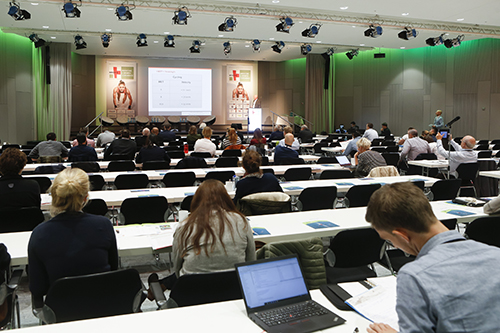MEDICA 2019 Trends: Sports Medicine

As the 2020 Summer Olympics in Tokyo quickly approaching and the 2022 FIFA World Cup soon thereafter, performance medicine will be top of mind, including regenerative medicine, at this year’s MEDICA Medicine and Sports Conference, taking place November 20–21, 2019 in Düsseldorf, Germany. The conference will take place in Düsseldorf, Germany as part MEDICA 2019 (November 18 – 21, 2019) the world’s leading medical trade fair with over 5,000 exhibitors. Sebastian Kienle, winner of the 2014 Ironman World Championship in Hawaii and a three-time Ironman European Championship winner, will be the keynote speaker kicking off the conference. Kienle recently told a publication, “If I had an identical twin and he pursued his career without the use of technology and data analysis, the poor guy wouldn’t stand a chance.” When training, he relies on state-of-the-art technologies, including those by Polar, Cortex Medical, Runscribe and Quarq. He aligns his training based on available real data. During his keynote, Kienle will discuss the role of data in preparing, competing, regenerating and preventing accidents and illness.
The 7th MEDICA MEDICINE + SPORTS CONFERENCE (MMSC) takes place November 20–21, 2019 in Düsseldorf, Germany as part MEDICA 2019 (November 18 – 21) the leading global medical trade fair with more than 5,000 exhibitors.Summer Is Coming: Preparing for Tokyo 2020
Kienle’s discussion will be followed by “Summer is coming! Preparation to Tokyo 2020 Olympics”, a talk by Dr. Stéphane Bermon, director of the Health and Science Department at the International Association of Athletics Federations (IAAF). Summer’s expected heat is a challenge for athletes and teams. Under normal ambient conditions, the body’s temperature increases to around 98.6 to 102.2 degrees Fahrenheit under stress. If the surrounding temperature is high, the body’s core temperature can rise to more than 102.2 degrees Fahrenheit while running a marathon, which can lead to an impairment of the body’s basic functions as well as resulting damage. Heat chambers, training locations with high temperatures, new biomedical devices such as pills that measure temperature, sweat analyzers, thermal imaging cameras, specially developed clothes and wearable electrolyte and thermal analyzers are used to research more effective preventive measures and to optimize the treatment of heatstroke. Global warming and the increasing number of endurance athletes are putting a bigger emphasis on heat-related illnesses and prevention. Bermon will focus on how the IAAF is handling these challenges.
Debunking Myths: Data and Artificial Intelligence
Technologies that collect relevant values for athletes also generate an enormous amount of other data. Dr. Dieter Leyk, head of the Federal Armed Forces’ Institute for Preventive Medicine, and Dr. Jarek Krajewski, CEO of the Institute for Experimental Psychophysiology in Düsseldorf, are teaming up to merge this data and make it available for use in grassroots and rehabilitation sports on the basis of artificial intelligence (AI). The Federal Armed Forces’ Institute for Preventive Medicine, has collected more than 1 million data sets from marathon runners aged between 20 and 80 years. Data findings could provide more insight into marathons while also demystifying common myths surrounding rehabilitation sports. Krajewski will also discuss computer-based automated monitoring of psychological and physical health conditions (based on audio, video and bio signals).
Personalized Training, Regeneration and Rehabilitation
Dr. David Niederseer, sports cardiologist at the University of Zurich, will discuss health sports. Actively commuting to work can battle the detriments of a seated lifestyle increasing travel times, according to preliminary study results in which some participants were told to either commute by public transport, by bike, on foot or using a combination, depending on the distance to their workplace. Participants in the control group were told to continue using their current methods of commute, while the active participants showed measurable improvement in their quality of life as well as general and mental health, and no significant changes could be identified in the control group.
Cannabis in Sports?
Cannabis is on the WADA’s (World Anti-Doping Agency) Prohibited In-Competition list, which means athletes are prohibited from taking these substances during competition. However, they are not explicitly forbidden during the training phase, provided national regulations allow their use. Since May 2017, doctors in Germany have only been allowed to prescribe patients cannabis in exceptional and justifiable cases. However, special permission to do so is not required. Under certain conditions, the drug’s anti-inflammatory, anti-convulsive, anxiolytic and anti-emetic effects can actually make sense in connection with regeneration after intensive sports. In the morning of November 21, Prof. Dr. Jeff Konin, Chair of the Physical Therapy Department at the University of Rhode Island, will explain how cannabis could be used during the regeneration phase.